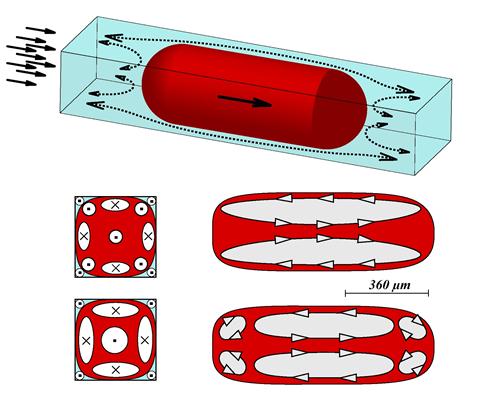A research team from the Institute of Physical Chemistry of the Polish Academy of Sciences (IPC PAS) has identified a new phenomenon pertaining to the fluid dynamics when microdroplets traverse microfluidic channels.
 A droplet of a chemical compound (red) translating along a rectangular microchannel does not occupy the entire microchannel cross section. The carrier liquid (blue) can bypass the droplet in corner areas of the channel. The sections below show a droplet along the channel axis and perpendicularly to the axis, visualising the changes in swirl distribution inside the droplets with increasing flow rate of the carrier liquid. (Source: IPC PAS)
A droplet of a chemical compound (red) translating along a rectangular microchannel does not occupy the entire microchannel cross section. The carrier liquid (blue) can bypass the droplet in corner areas of the channel. The sections below show a droplet along the channel axis and perpendicularly to the axis, visualising the changes in swirl distribution inside the droplets with increasing flow rate of the carrier liquid. (Source: IPC PAS)
The research team discovered that droplets of chemicals in a carrier liquid, such as oil, flowing through microchannels behave unusually, although they follow laminar flow. Dr. S³awomir Jakie³a explained that the phenomenon discovered by the team is associated to alterations in swirls within the microdroplets that have not yet been explained by current theoretical models. The study findings have been reported in Physical Review Letters.
According to Jakie³a, it is important to understand all physical phenomena related to the microdroplet flow in order to develop advanced microfluidic systems. For the experiment, the research team made microdroplets from glycerine aqueous solutions of various concentrations, and thus with different viscosities. These microdroplets are made to flow in hexadecane oil (carrier liquid) via a rectangular channel having a length of 10 cm.
The research team calculated the microdroplet speed with respect to the oil as a function of the carrier liquid’s flow speed, oil and droplet viscosities, and the volume of microdroplets. The team discovered that if the microdroplets’ viscosity was below or equivalent to that of hexadecane oil, their speed with respect to the carrier liquid reduced with higher droplet length for a certain range.
However, when the research team altered the oil flow rate, the least speed of the microdroplets with respect to the oil started vanishing with rising flow rate. When the oil flow rate increased further, the least droplet speed, but wider and deeper, started reappearing. Jakie³a explained that the team found that based on the flow rate of the oil, a microdroplet of particular length can travel faster under certain conditions and slower under other conditions with respect to carrier oil.
To discover the reason behind the unusual behavior of the microdroplets, the research team introduced fluorescent markers into the microdroplets, and then irradiated with a laser light when they traversed the microchannel, causing the fluorescent markers to get excited. The team used this excitation to study the movements of the fluid inside the microdroplets.
Prof. Piotr Garstecki explained that the research team had discovered that the formation of swirls in a droplet varied proportionally with the oil flow rate, which is contrary to the existing theories hypothesizing that the count of swirls in microdroplets reduce with rising oil flow rate.
At the IPC PAS, a work has begun to implement the new phenomenon to mix the microdroplet contents in microfluidic systems.